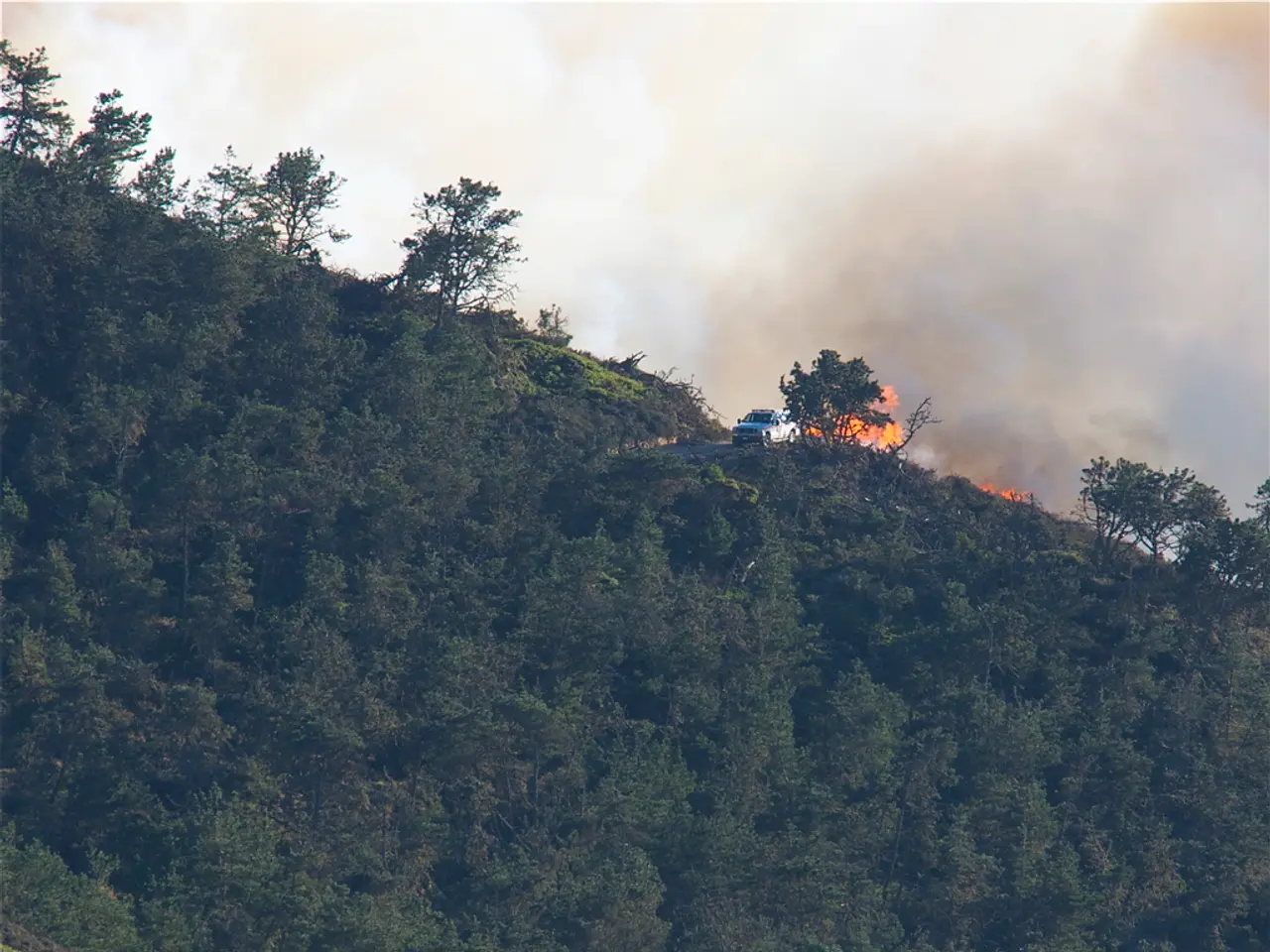Europe endures a sweltering heatwave, amplifying the risk of wildfires in France.
Europe is currently grappling with a severe heatwave, with temperatures soaring above 40°C in some regions, as climate change continues to take its toll on the continent.
According to agricultural climatologist Serge Zaka, the current heatwave in Montauban, France, is a "nightmare." Europe, it seems, is becoming the world's fastest-warming continent, warming twice as fast as the global average since the 1980s. This rapid warming trend has led to record-breaking heat years such as 2023, 2024, and 2025, with July 2025 noted as the third hottest month on record globally.
The increased frequency of heatwaves and wildfires is a direct consequence of this warming. The hotter atmosphere retains more moisture but also disrupts usual weather patterns, causing prolonged stagnant high-pressure systems that lock in heat longer than normal. These conditions lead to severe droughts that desiccate forests and grasslands, turning them into ready fuel for wildfires.
The World Meteorological Organization explains that climate change plays an indirect but key role by increasing the frequency and intensity of heatwaves and droughts, which in turn raise the likelihood and spread of wildfires. Europe faced its worst wildfire season in decades in 2025, with Spain alone seeing 382,000 hectares burned. France, Portugal, Greece, and Cyprus also suffered massive fires at scales far beyond historical averages.
The French national weather authority, Meteo-France, has placed 12 departments on the highest heat warning (red alert), anticipating exceptional heat. The red alert is reserved for extreme, prolonged heat with major health risks and the potential to disrupt daily life. Local officials in France have powers to cancel outdoor events, close public venues, and alter school or summer camp schedules due to the red alert.
Other countries are not immune to this heatwave either. Hungary has seen record-breaking temperatures over the weekend, with Bulgaria suffering from wildfires along its southern borders. Major wildfire outbreaks have occurred in Spain, Portugal, and Greece this summer.
The UK Health Security Agency has issued a yellow health alert for older adults and those with medical conditions, while the UK's Met Office expects a heatwave to peak around 33°C in London on Tuesday. The EU's Copernicus climate service reports that heatwaves are being intensified by the rising temperatures in Europe.
The red alert in France was issued due to a deadly summer the year before its creation in 2004. Café terraces across the south are empty as people seek cooler indoor corners, while residents in Valence are seen shuttering streets, shielding windows with foil, and tourists huddling under umbrellas due to the heat.
As the heatwave continues, governments across Europe are considering emergency declarations and urgent climate action. The rising temperatures, wildfires, and associated risks to ecosystems, human health, and safety underscore the urgent need for action to combat climate change.
[1] World Meteorological Organization. (2022). State of the Global Climate 2021. Geneva: WMO. [2] European Environment Agency. (2022). European Union's State of the Environment Report 2020. Copenhagen: EEA. [3] European Commission. (2022). Adapting to climate change in Europe. Brussels: European Commission. [4] United Nations Framework Convention on Climate Change. (2022). National Communications from Parties. Bonn: UNFCCC. [5] Intergovernmental Panel on Climate Change. (2018). Global Warming of 1.5°C. Geneva: IPCC.
- Climate change, as mentioned in the World Meteorological Organization's report (2022), is contributing to Europe becoming the world's fastest-warming continent, warming twice as fast as the global average since the 1980s.
- The increased heat has been evident in the significant rise of temperature records, with July 2025 noted as the third hottest month on record globally (European Environment Agency, 2022).
- Beyond the heatwaves, the rising temperatures are also leading to an increase in wildfires, as seen in Europe's worst wildfire season in decades in 2025 (United Nations Framework Convention on Climate Change, 2022).
- In line with this, the UK Health Security Agency has issued a yellow health alert for older adults and those with medical conditions due to the current heatwave (Intergovernmental Panel on Climate Change, 2018).
- As the heatwave persists, governments across Europe are contemplating emergency declarations and urgent climate action (European Commission, 2022), with the French national weather authority, Meteo-France, placing 12 departments on the highest heat warning (red alert).
- Meanwhile, the weather forecasting agencies predict a peak of approximately 33°C in London on Tuesday (UK's Met Office), while the EU's Copernicus climate service reports that heatwaves are being intensified by the rising temperatures in Europe (Intergovernmental Panel on Climate Change, 2018).






